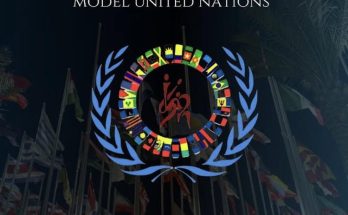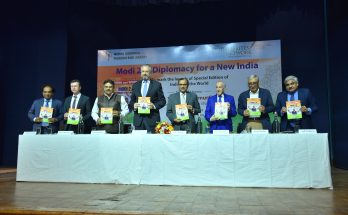
LSR Model UN 2024, Making it Matter
By Deepakshi Bhardwaj In the heart of New Delhi – India’s geopolitical epicentre, Lady Shri Ram College for Women (LSR) stands as a beacon of academic excellence contributing to …
Read MoreGlobal Indian News

By Deepakshi Bhardwaj In the heart of New Delhi – India’s geopolitical epicentre, Lady Shri Ram College for Women (LSR) stands as a beacon of academic excellence contributing to …
Read More
In an overarching speech delivered at the launch of the special edition of India and the World magazine, T.S. Tirumurti, Secretary in charge of economic affairs in India’s Ministry of …
Read MoreThe birth of a publication is always a reason for celebration. The birth of a publication at a time when print is under some strain is a cause for even greater celebration. But the birth of a print publication in a time of strain, on a subject that is of a close interest to the distinguished audience here, is perhaps the most welcome part of the evening. I hope the subject will actually determine the quality of the publication.
Foreign affairs and diplomacy are two of the most important aspects of government, have always been, particularly now in the current environment and context in which we live. Let me begin with a question that is immediate. What has happened in the last three years that is a significant change with the past? The first articulation of our foreign policy was made in March 1946 at the Asian Relations Conference and it is also an indication of how seriously the first Prime Minister Jawaharlal Nehru took foreign policy. He had already begun, in a sense, the concept of multilateralism, established it with that conference, at a time when the post-war world was still searching for some way forward. At a time when colonisation still seemed one power that the world would not easily get rid of.
Now, it’s only in hindsight that we can say that 1947 was a seminal year because, in a real way, Europe’s colonial power began with Britain’s success in India and it also ended with Britain’s collapse in India.
After the British lost their raj, it was only a matter of time before colonialism all across the world collapsed. But in 1946, certainly the spirit of Lord [Satyendra] Sinha was more prevalent. As a law member, he’d famously remarked about Mahatma Gandhi that: “I don’t understand what this man in a dhoti is doing, the British are going to be around here for 400 years.”
That was the prevalent wisdom and that was a prevalent assessment. He wasn’t far off from what conventional thinking in 1917 suggested and yet, when Gandhiji started, the Empire could not survive more than 30 years. The reason was that a man had come who mobilised the will of the people against an elite. Previously, all the colonial powers had to do was to confront and defeat local elites in order to establish their expansion. They never had to deal really with the people.
India and Pakistan will be looking to map the way forward for improving their strained ties during Foreign Secretary S. Jaishankar’s maiden trip to Islamabad March 3. Mr Jaishankar will …
Read More
India’s South Asian diplomacy is set to acquire a renewed momentum during Foreign Secretary S. Jaishankar’s planned visit to all SAARC nations in March. Mr Jaishankar, who took charge as …
Read More
Diplomacy is the art of the possible. If successful and effective diplomacy is about reigniting the spark in old relationships, winning new friends, breaking new grounds, and shaping the outcomes in the international arena to promote the country’s enlightened national interests and development, then the seven-month old Narendra Modi government scores high as it builds on the successes of 2014 and looks ahead to 2015 with “new vision and new vigour.” Breakthrough Diplomacy, as India’s External Affairs Minister Sushma Swaraj writes in a prologue to the eponymous e-book published by India’s Ministry of External Affairs, is about melding ‘Diplomacy for Development’ as the overarching themes in India’s global engagements.
“2014 has truly been a Year of Breakthrough Diplomacy. India’s star is today shining ever brighter on the global firmament,” writes Swaraj.
Talking of breakthrough diplomacy, it’s time to unscramble the jargon and introduce some balance in diplomatic discourse and the unfolding possibilities in the coming months. For one thing, breakthroughs don’t happen every day or every year in diplomacy; the India-US nuclear deal was a breakthrough, but getting Obama to be the chief guest at the 2015 Republic Day celebrations is a diplomatic triumph, but not a breakthrough. To claim routine diplomatic successes as breakthroughs, therefore, would be misleading, and lowering the bar. For another thing, diplomatic breakthroughs presuppose a perceptible and substantive rise in a country’s comprehensive national power, economic and military strength as well as soft power.

Signalling an upsurge in India’s thriving ties with Southeast Asian countries, India has unveiled a slew of steps to galvanise relations with this economically vibrant region, which includes the setting …
Read More